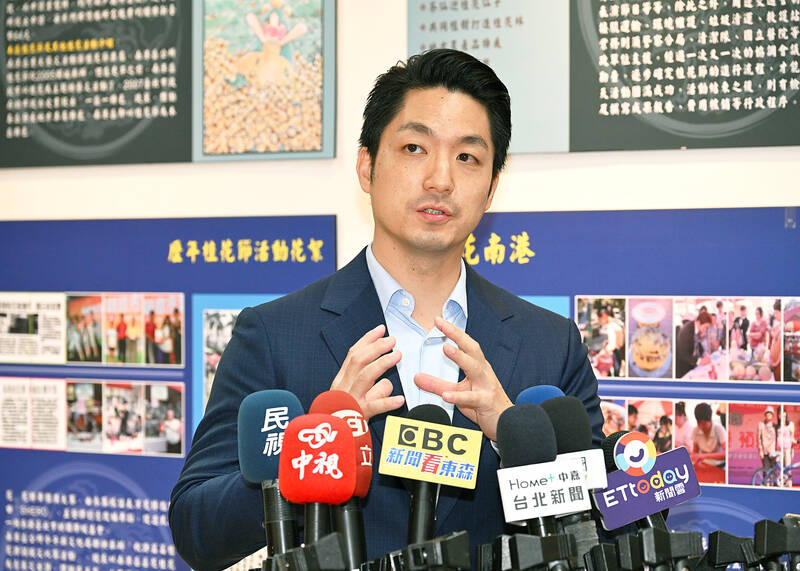Taipei Mayor Chiang Wan-an (蔣萬安) yesterday said the city government would look into EasyCard Corp’s Emerging Stock Market listing process shortly before a change in administration in December last year.
Local media outlets on Thursday said that Chiang was none too pleased to learn that the city government, led by then-mayor Ko Wen-je (柯文哲), had made the decision about EasyCard’s listing just before Ko’s term ended, saying it would dilute the government’s shares in the company.
EasyCard on Dec. 9 announced that its board had approved its plan to apply for listing on the Taipei Exchange’s Emerging Stock Market. Ko stepped down from his post on Dec. 25, and the company debuted on the stock market in January.

Photo: Tien Yu-hua, Taipei Times
During a question-and-answer session at the Taipei City Council on Friday last week, Chiang said that the decisionmaking process for EasyCard’s listing appeared rushed, and a caretaker government should respect public opinion when making a major decision that would affect a company’s future operations and the disposal of public property.
Chiang said he has instructed Taipei City Government Secretary-General Lee Tai-hsin (李泰興) to gather officials from the city’s departments of legal affairs, finance and transportation, and EasyCard this week to gain an understanding of the case.
Ko on Friday said that Chiang is not familiar with city government administration, as any decision must be made by the company’s board of directors and the Financial Supervisory Commission.
Ko added that the decision to list the company would not affect the city government’s rights and would make it more difficult to interfere with the company’s decisions.
Former EasyCard chairwoman Ting Chen (陳亭如) yesterday wrote on Facebook that the company had reported to Chiang and city government officials about the listing in late December and again on Jan. 11, so the city government must know about it.
Asked about Ting’s comments, Chiang yesterday said the decision was made last year and submitted for review before the new city councilors took office, which was disrespectful of public administration procedures.
As city councilors and the public have concerns about the case, the city government would look into it as his first priority is the rights of the city’s residents, he added.

Trips for more than 100,000 international and domestic air travelers could be disrupted as China launches a military exercise around Taiwan today, Taiwan’s Civil Aviation Administration (CAA) said yesterday. The exercise could affect nearly 900 flights scheduled to enter the Taipei Flight Information Region (FIR) during the exercise window, it added. A notice issued by the Chinese Civil Aviation Administration showed there would be seven temporary zones around the Taiwan Strait which would be used for live-fire exercises, lasting from 8am to 6pm today. All aircraft are prohibited from entering during exercise, it says. Taipei FIR has 14 international air routes and

The Ministry of National Defense (MND) today released images of the military tracking China’s People's Liberation Army (PLA) movements during the latest round of Chinese drills around Taiwan. The PLA began "Justice Mission 2025" drills today, carrying out live-fire drills, simulated strikes on land and maritime targets, and exercises to blockade the nation's main ports. The exercises are to continue tomorrow, with the PLA announcing sea and air space restrictions for five zones around Taiwan for 10 hours starting from 8:30am. The ministry today released images showing a Chinese J-16 fighter jet tracked by a F-16V Block 20 jet and the

Snow fell on Yushan (Jade Mountain, 玉山) yesterday morning as a continental cold air mass sent temperatures below freezing on Taiwan’s tallest peak, the Central Weather Administration (CWA) said. Snowflakes were seen on Yushan’s north peak from 6:28am to 6:38am, but they did not fully cover the ground and no accumulation was recorded, the CWA said. As of 7:42am, the lowest temperature recorded across Taiwan was minus-5.5°C at Yushan’s Fengkou observatory and minus-4.7°C at the Yushan observatory, CWA data showed. On Hehuanshan (合歡山) in Nantou County, a low of 1.3°C was recorded at 6:39pm, when ice pellets fell at Songsyue Lodge (松雪樓), a

NO SHAME IN RETREAT: Hikers should consider turning back if the weather turns bad or if they do not have sufficient equipment, the Taroko park headquarters said Two people died of hypothermia over the weekend while hiking on Hsuehshan (雪山), prompting park authorities to remind hikers to bring proper equipment and consider their physical condition before setting out in the cold weather. Temperatures dropped over the weekend, bringing snow to high altitudes in Shei-pa National Park. One hiker, surnamed Lin (林), who on Friday was traveling with a group of six along the Hsuehshan west ridge trail, lost consciousness due to hypothermia and died, the Shei-pa National Park Headquarters said. On Saturday, another hiker, surnamed Tien (田), in a group of five on the southeast of the west